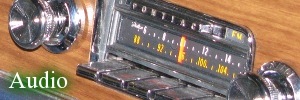















South Korean Carmakers Make Huge US Sales Increases |
|---|
 Topics: Hyundai, Kia
Topics: Hyundai, Kia
|
Michael Leland
Chicago
February 10, 2002
 Listen to South Korean Carmakers Make Huge US Sales Increases - RealPlayer - 354KB - 2:51
Listen to South Korean Carmakers Make Huge US Sales Increases - RealPlayer - 354KB - 2:51
The so-called "big three" automakers in the United States, General Motors, Ford and DaimlerChrysler, each saw their U.S. sales decline last year. The news was better for a couple of South Korean carmakers, which saw double-digit sales increases. The Hyundai and Kia companies expect their success to continue this year.
Hyundai has sold cars in the United States since the mid-1980's. For years, Hyundai had a reputation of being inexpensive cars of sometimes-questionable quality. Now, the company's United States division president Finbarr O'Neill says many buyers are looking first at other foreign and U.S.-made cars, and choosing Hyundai. "Before, in some sense, we might have been viewed as a brand of last resort," he says. "Cross-shopping was more domestic. Now we are a brand of choice and we are being shopped against all the mainstream brands."
While the three big U.S. car companies saw sales drop between one and ten percent last year, Hyundai and its subsidiary, Kia, had sales increases of about 40 percent each. Despite the increase, the South Korean companies still sell far fewer cars in the U.S. than the big three, but Hyundai and Kia officials are confident their cars will continue to grab a larger slice of the American car market.
Hyundai's Finbarr O'Neill says one reason for the companies' success in recent years has been an improvement in the quality of their vehicles. To win customer confidence, the companies offer a 10 year or 160,000 kilometer warranty on each new vehicle. "What this does is underscore our strategy of value, quality and a smart buy, but it does even more: it addresses the emotional aspect in a purchase," he says. "That is the assurance to the buyer that they are going to be taken care of."
Journalists who cover the auto industry still write that Hyundais and Kias have questionable resale value, but it does seem clear than an increasing number of Americans are willing to give the South Koreans a try. Kia's U.S. executive vice-president Peter Butterfield says the average Kia buyer is in his or her late-30's with a slightly-higher-than-average income. "So it is not an image of someone who can not afford to buy a product," he says. "It is mainstream America. That is what is so fun and exciting about this product: we build products for mainstream America."
Both Kia and Hyundai appear to be trying to win repeat customers by building larger passenger cars and sport-utility-vehicles than they had offered in the past. Later this year, Hyundai will decide where to build its first U.S. manufacturing plant. Also, the two companies plan to jointly build a design center in California.
